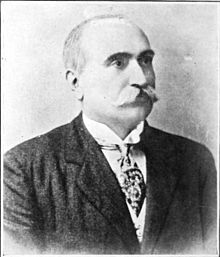Dorabji Tata
Sir Dorabji Tata (also Dorab Tata , born August 27, 1859 , † June 3, 1932 in Bad Kissingen ) was an Indian industrialist who helped build the Tata Group . Tata was the eldest son of Jamsetji Tata , the Parish founder of the Tata industrial group.
He went to school in Bombay and was from 1875 in England, where he received private tuition and then from 1877 attended Cambridge University ( Gonville and Caius College ), where he excelled in particular in sports. In 1879 he continued his studies at St. Xavier's College in Bombay, where he graduated in 1882 and then worked for two years as a journalist for the Bombay Gazette. He then joined his father's company (which mainly consisted of cotton companies and the Taj Hotel in Bombay), where he was initially responsible for cotton production. He built up the steel companies and the associated power plants in his father's corporate empire (thereby fulfilling one of the central goals of his father, who wanted to advance industrialization and education in India), which later became the core of the Tata Group. There was also a large insurance group under his leadership. He was supported by his brother Ratan Tata (1871-1918), and his cousin Ratanji Dadabhoy Tata (father of the Air India founder and later head of the Tata Group JRD Tata ). In recognition of his services to the industrialization of British India , he was ennobled in 1910 by Edward VII as a Knight Bachelor and from then on carried the title "Sir".
He was also an avid sports fanatic and was President of the Indian Olympic Society. As a member of the International Olympic Committee, he organized and financed the participation of Indian athletes in the Olympic Games in Antwerp in 1920 and Indian participation in the 1924 Olympic Games in Paris .
In 1897 he married Meherbai Bhabha, who died of leukemia in 1931 . His wife was also an avid athlete (she won several tennis championships) and a woman’s rights activist (President of the National Council of Woman in India). She is the aunt of the physicist Homi Jehangir Bhabha , who was also promoted by Tata. In 1932, Tata established a foundation for research into leukemia in memory of his wife. In the same year, Tata himself, who had been suffering from diabetes for a long time , died while visiting Europe. The couple had no children and left behind an extensive foundation for the advancement of science (Sir Dorabji Tata Trust), from which among other things the establishment of the Tata Institute of Fundamental Research in 1945 was financed. He also previously financed the founding of the Indian Institute of Science in Bangalore , donated the University of Cambridge (including a chair in Sanskrit) and an art collection to the Prince of Wales Museum in Mumbai .
Tata and his wife are buried in Brookwood Cemetery, England, in a mausoleum modeled after that of the Persian King Cyrus in Pasargadae .
Web links
- Biography on the sides of its Foundation (English)
Individual evidence
- ↑ Biography at the Sir Ratan Tata Trust ( Memento of the original from October 26, 2010 in the Internet Archive ) Info: The archive link has been inserted automatically and has not yet been checked. Please check the original and archive link according to the instructions and then remove this notice.
- ↑ irrespective of location, nationality or faith , without any distinction of place, nationality or creed
| personal data | |
|---|---|
| SURNAME | Tata, Dorabji |
| ALTERNATIVE NAMES | Tata, Dorab |
| BRIEF DESCRIPTION | Indian industrialist |
| DATE OF BIRTH | August 27, 1859 |
| DATE OF DEATH | June 3, 1932 |
| Place of death | Bad Kissingen |
